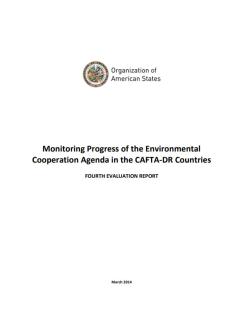
Since 2005, the United States has invested approximately US$ 87.2 million to fund the Central America-Dominican Republic-United States Free Trade Agreement (CAFTA-DR) environmental cooperation. This funding is helping CAFTA-DR countries advance in the following four programmatic areas: (A) Institutional Strengthening for Effective Implementation and Enforcement of Environmental Laws; (B) Biodiversity and Conservation; (C) Market-based Conservation; and (D) Improved Private Sector Performance.
In support of these areas, the Environmental Cooperation Agreement (ECA) (Article IV) requires that the Environmental Cooperation Commission (ECC) be responsible for examining and evaluating the cooperation activities under the Agreement. The ECA highlights as well that the ECC must also seek and consider input from relevant international organizations and other stakeholders regarding how best to ensure that it is accurately monitoring progress.
Starting in 2009, the OAS-DSD has prepared independent evaluation reports to provide a general overview of the CAFTA-DR Environmental Cooperation Program (ECP), including success stories, case studies, challenges and recommendations witnessed from the beginning of the implementation of the Program, with a view to improve future environmental cooperation programming.
This Fourth Evaluation Report aims to go beyond the mere conduct of activities by implementing agencies. Following various modes of operations, it explores the strengthening of capacities of government and civil society stakeholders (e.g. CSOs, the private sector and the general public) to protect, improve and conserve the environment. To this end, the report underlines the impact of interventions regarding environmental legislation and policy development, economic and social development, and environmental protection. These essential, interdependent factors fuel sustainable development in the CAFTA-DR signatory countries.
